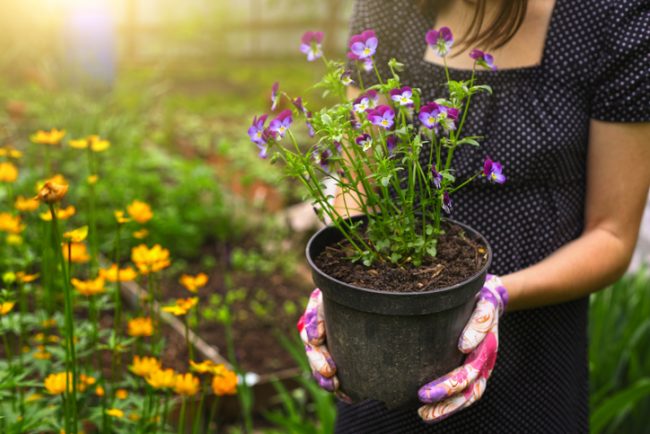Epsom salts have been used for decades for a variety of healing benefits and natural home remedies. Some of these include relieving pain by soaking in a warm bath with Epsom salt and water, relieving constipation when used as a saline laxative, natural skin exfoliation, and believe it or not, even gardening.
Epsom salt is essentially a potent form of magnesium sulfate and it contains natural alkalizing agents and healing benefits as a result. When it comes to your garden, Epsom salt is an effective tool that can ward off garden pests, improve seed germination, and even improve the color of the plants, too. Here are 5 effective ways you can use it in your garden this year!
1. Fight Garden Pests
You can naturally deter garden pests with a little bit of Epsom salt since it’s essentially hydrated magnesium crystals, which keep them from invading your garden. The crystals are sharp and act as natural weapons, so pests will avoid coming into contact with them due to it harming them. Hopefully, they’ll learn to stay away for good after you use it for a while!
2. Grow More Delicious Fruits and Veggies
There are several ways that Epsom salt can help improve the flavor of your garden fruits and veggies. For starters, plants such as tomatoes are prone to mineral deficiencies, including magnesium and calcium. This affects the soil and as a result, decreases the delicious flavor of tomatoes.
The magnesium in Epsom salts can help improve the magnesium uptake into the plant, which helps directly keep tomatoes from rotting as quickly and makes them naturally sweeter. Most commercial fertilizers only contain calcium which directly competes with magnesium uptake (in the soil and in our bodies), so applying Epsom salts to your garden two or three times a year can naturally combat this issue. Other plants, such as peppers and strawberries also benefit from magnesium uptake to help improve their flavor and the plants’ overall yield.
3. Increase Seed Germination
Epsom salts give your garden a little “get up and go” right from the start in several ways! For starters, the magnesium in the salt aids in the initials seed germination and helps strengthen the cell walls of the plant. This leads to a greater yield and quicker germination overall. Apply 1 cup of Epsom salt per 100 square feet of your garden once it has been tilled. You can also mix a couple of tablespoons into the soil at the bottom of each hole before dropping the seeds into the soil.
4. Improve the Color of the Plants
Epsom salt naturally increases the uptake of chlorophyll in plants, which is the natural dark green, beautiful hue that most all plants contain. To keep your rose leaves greener, your veggies more beautiful, and your other plants more lovely, be sure to apply Epsom salt regularly. A good measurement to start with is roughly one or two tablespoons per square foot. Simply sprinkle the Epsom salt on the soil of your garden or in the soil directly onto the plant (for smaller potted plants, use much less such as 1 tsp.).
5. Keep Those Leaves Lovely and Prevent Them From Curling
Have you ever noticed how some of your plants’ leaves start to curl up around the edges? It’s one thing that boggles the mind of many gardeners and plant lovers who do their best to nourish their plants year round. The curling of leaves is actually a simple sign: the plant is deficient in minerals, primarily magnesium. You can sprinkle a little Epsom salt around the base of the affected plant to help combat this issue quickly and speed healing. Repeat this daily and water only as needed until the plant begins to heal. You can also mix 2 tbsp. Of Epsom salt into a gallon of water and spray it lightly onto the leaves for a quicker fix. Stop spraying the mixture after the plants have healed and check it regularly.
For best results, always use plain Epsom salt without any added fragrances, dyes, or chemicals; check the label to be certain. Keep a large bag of Epsom salt around your home this summer and give a few of these natural options a try if you have a summer garden to tend to. Who knows? It might just become your favorite gardening tip to give to someone else!
Related reading: Learn the basics of epsom salt skin care

